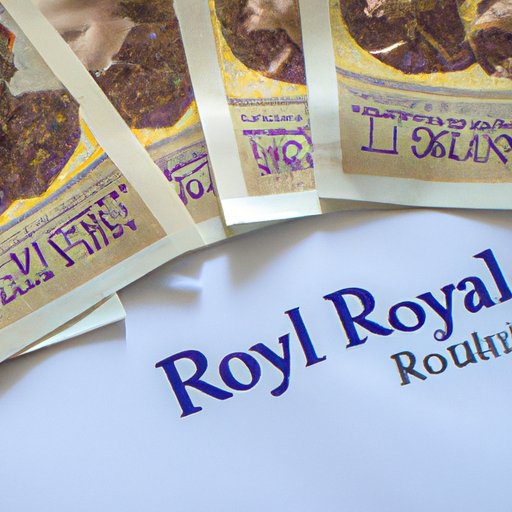
Introduction
The British monarchy is one of the most recognizable and iconic kingdoms in the world. The Royal family has garnered a lot of attention for its wealth, properties, and charity work. In this article, we will explore the sources of income of the Royal family and how much they contribute to society.
The purpose of this article is to help the audience understand the financial workings of the Royal family. We will briefly discuss the history of the British monarchy, its financial relationship with the government and how it has evolved over the years.
The British Monarchy’s Financial Relationship with the Government
The British monarchy is an institution that has existed for centuries. Their relationship with the government has undergone significant changes over time. The legal basis for the arrangement between the monarchy and the government dates back to the 17th and 18th century.
Today, the sovereign grant forms the cornerstone of the Royal family’s income, which is an annual sum from the government meant to cover expenses related to their official duties. The Royal family does not receive any money from taxation nor does it own the Crown Estate. Instead, the profits from the estate are paid to the Treasury, which funds government programs and projects.
Case Studies: How the Royal Family Generates Income
The Royal family has leveraged their brand to generate income from various businesses. For instance, the marketing of the monarchy through souvenirs, memorabilia and exhibitions has become a significant source of income. The Royal Collection Trust administers the collection of the British monarchy, and tickets are sold to visitors to view the collection.
The Crown Estate is also one of the major contributors to the Royal family’s income. The estate includes a range of properties such as farms, offices, residential, and commercial properties. The management and administration of the estate are performed by an organization appointed by the monarch. The profits generated from the estate are paid to the Treasury, which funds national initiatives.
The Royal Family’s Real Estate Portfolio
The Royal family has a vast real estate portfolio, which includes some of the most significant and historic properties in the UK. The portfolio encompasses Buckingham Palace, Kensington Palace, St. James’s Palace, Windsor Castle, and the Palace of Holyroodhouse. These properties are used for official events and are open to the public for guided tours.
The income generated from these properties is varied, but it comes from a mixture of visitor fees, ticket sales, and commercial rents. Buckingham Palace alone generates an estimated 17 million pounds per year from visitor fees. Moreover, properties such as Balmoral Castle and Sandringham House provide a source of revenue through their popularity as tourist attractions.
Salaries of Working Members of the Royal Family
The working members of the Royal family, including the Queen and Prince Charles, receive an annual salary from the sovereign grant. The exact salary is not disclosed to the public, but the amount is determined by the size of the grant. The Queen also benefits from the privy purse, which is her personal wealth.
The salaries of the Royal family members are modest compared to other heads of state. For instance, the Queen’s salary is less than a quarter of the salary of the President of the United States. Additionally, most of the money paid to the Royal family goes towards expenses related to their official duties, staff salaries, and palace upkeep.
The Royal Family’s Contribution to British Tourism
The Royal family has become one of the country’s leading attractions, drawing visitors from all over the world. For instance, Buckingham Palace receives approximately 15,000 visitors per day during the time it’s open to the public. The Royal family’s annual events, such as the Trooping of the Colour, also attract crowds.
The contribution of the Royal family to British tourism is significant. In 2017, the tourism sector generated revenue of approximately £50 billion in the UK. The income generated from the Royal family’s events and properties make a sizeable contribution to this figure. For instance, London’s theatres, museums, and galleries benefit significantly from the tourism industry, which the Royal family helps to sustain.
The Royal Family’s Charitable Work
The Royal family is involved in several charitable organizations, and members often serve as patrons. Charities aimed at addressing social problems, such as poverty, HIV, mental illness, and education, are among the organizations that the Royal family contributes to.
In 2018, the Royal family supported over 3000 charities globally. In addition, the Royal Foundation of the Duke and Duchess of Cambridge and Prince Harry was established to support specific charities and causes related to mental health and environmental conservation.
Controversies and Debates Surrounding the Royal Family’s Finances
There are debates on the finances of the Royal family. Some argue that the monarchy is an outdated and wasteful institution that contributes little value to society while others believe that the monarchy should be protected as a symbol of national identity.
The cost of the Royal family to taxpayers is a contentious issue. Although it is maintained that they do not receive money from taxpayers, the sovereign grant is, in effect, funded by taxpayers. Critics argue that the Royal family’s public-funded lifestyle does not reflect the struggling British economy. On the other hand, proponents argue that the monarchy contributes to the country’s economy through tourism and should remain a part of the national identity.
Conclusion
The Royal family’s sources of income are varied and are spread across the Crown Estate, ticket sales from events and tours, and salaries to working members of the family. Furthermore, they have contributed positively to British tourism, charity work, and social causes.
Although controversies surround the Royal family’s finances, it is clear that their contribution to the economy is significant. The Royal family has become a part of the national identity of the UK and will continue to play a critical role in shaping the country’s future.




